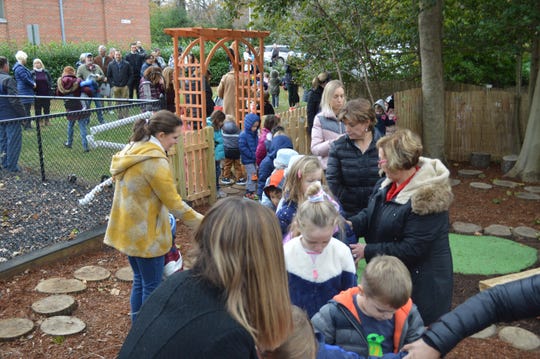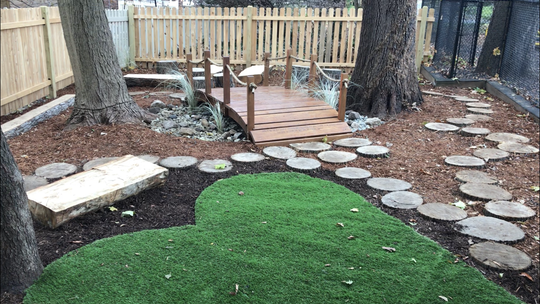
RIDGEWOOD — A new outdoor classroom at Bethlehem Early Learning Center will combine imaginative play with reading, math and environmental education for more than 100 preschool students.
On Monday, a swarm of toddlers entered the classroom single-file, bundled in puffy coats to guard against the morning mist. Steppingstones made from tree stumps led the children past a heart-shaped turf patch and across a bridge to a little gathering area — and then back out again, through an entryway framed with wooden butterflies.
“The point of this is that it is a space for them to learn and play and use their imaginations outdoors,” said Bethlehem Early Learning Center Director Karen Mabli, who was working to bring the space to life even before she began her tenure as director in September.
In spring, the school will start a worm farm, Mabli hopes. The children will save scraps from their lunches to feed worms, and they’ll use the resulting compost as fodder for growing organic plants, such as flowers or vegetables.
The children will also keep an eye on wildlife: Bird feeders will teach them about the local avian population, and they’ll search for animal footprints after snowfalls, Mabli said.
“They’re little sponges, so they soak it up and they learn so quickly,” she said. “They carry that with them forever.”
The project took around six months to complete, from design work in June to construction beginning in September.
In that time, a group of loyal volunteers transformed the space from a poison-ivy-ridden patch of ground with waist-high weeds into a sort of oasis.
“We really wanted to create an environment that was nature-based,” said Kristen Kuiken, a parent and volunteer who helped design the space. Most of the classroom’s elements, she added, were donated; Bethlehem Church, the school’s parent organization, helped pay for the surrounding fence.
The steppingstones are made from reclaimed tree lumber, Kuiken said.
The preschool’s outdoor classroom comes as researchers raise alarms that people, especially children, are spending less time outdoors. This phenomenon can have negative effects on populations, a term called nature deficit disorder.
That kids don’t spend enough time outside is no new revelation, and technology has worsened the effects. Children ages 2 to 4 spend more than 2½ hours daily with screen media, according to a 2017 report by Common Sense, a nonprofit that provides media and technology recommendations for youth.
A 2014 study of 11 outdoor classrooms identified a slew of benefits, such as relaxation, behavior, creativity, focus and engagement. Researchers also found that outdoor classrooms reduce separation anxiety.
“Anything that could be done in the classroom can be done out here and be expanded,” Mabli said. “It’s less of a playground, more of an experiential learning center.”

The classroom is also a nod to retiring director Beth Hasbrouck, who had long hoped for an outdoor space at the preschool, Mabli said.
Hasbrouck was on hand Monday for the classroom’s opening, encouraging children through a gate that bears her name.
“It’s just like a dream come true,” said Hasbrouck, who led the preschool for 17 years before retiring this summer. “I’m so excited for the kids.
“I plan on coming back and hopefully reading in the spring to the kids,” she added, tearing up. “It was a huge surprise. I had no idea.”
The sensory nature of the space will be transformative, Mabli said.
“It’s endless, the opportunities,” she said. “We’re only limited by the imagination of the teachers — which is limitless.”
The original reporting includes a slideshow, video and text. Click here to view the original presentation (paywall).
This story was produced in collaboration with the New Jersey Sustainability Reporting Hub project. It was originally reported by Alexis Shanes for northjersey.com, and may be re-distributed through the Creative Commons License, with attribution.
